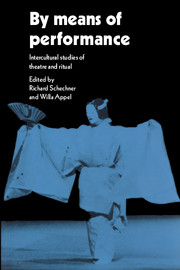Book contents
- Frontmatter
- Contents
- List of figures
- Notes on contributors
- Concerning Victor Turner
- Introduction
- 1 Are there universals of performance in myth, ritual, and drama?
- 2 Magnitudes of performance
- 3 Liminality: a synthesis of subjective and objective experience
- 4 The Yaqui deer dance at Pascua Pueblo, Arizona
- 5 A Yaqui point of view: on Yaqui ceremonies and anthropologists
- 6 Performance of precepts/precepts of performance: Hasidic celebrations of Purim in Brooklyn
- 7 The significance of performance for its audience: an analysis of three Sri Lankan rituals
- 8 What does it mean to “become the character”: power, presence, and transcendence in Asian in-body disciplines of practice
- 9 Korean shamans: role playing through trance possession
- 10 The practice of noh theatre
- 11 The profanation of the sacred in circus clown performances
- 12 Ethnographic notes on sacred and profane performance
- 13 The spatial sense of the sacred in Spanish America and the American South and its tie with performance
- 14 Space and context
- 15 The transformation of consciousness in ritual performances: some thoughts and questions
- 16 Universals of performance; or amortizing play
- Appendix
- Bibliography
- Index
14 - Space and context
Published online by Cambridge University Press: 05 June 2012
- Frontmatter
- Contents
- List of figures
- Notes on contributors
- Concerning Victor Turner
- Introduction
- 1 Are there universals of performance in myth, ritual, and drama?
- 2 Magnitudes of performance
- 3 Liminality: a synthesis of subjective and objective experience
- 4 The Yaqui deer dance at Pascua Pueblo, Arizona
- 5 A Yaqui point of view: on Yaqui ceremonies and anthropologists
- 6 Performance of precepts/precepts of performance: Hasidic celebrations of Purim in Brooklyn
- 7 The significance of performance for its audience: an analysis of three Sri Lankan rituals
- 8 What does it mean to “become the character”: power, presence, and transcendence in Asian in-body disciplines of practice
- 9 Korean shamans: role playing through trance possession
- 10 The practice of noh theatre
- 11 The profanation of the sacred in circus clown performances
- 12 Ethnographic notes on sacred and profane performance
- 13 The spatial sense of the sacred in Spanish America and the American South and its tie with performance
- 14 Space and context
- 15 The transformation of consciousness in ritual performances: some thoughts and questions
- 16 Universals of performance; or amortizing play
- Appendix
- Bibliography
- Index
Summary
Culture viewed as speech, gesture, and action is performance; and performance not only requires but commands its own kind of space. I should like to discuss this theme under two headings: 1) precultural or unrehearsed acts and 2) rehearsed acts, as well as a sample of those acts that fall between these two extremes.
Unrehearsed acts
Infants do not perform. Their self-consciousness and consciousness of others are minimally developed. The space they occupy is small; likewise the world they perceive. As they grow older they gain greater mobility, acquire more control over space, and become more aware of the expectation and critical appraisal of others. They have fallen from innocence into culture – into a life of performance. Older children and adults are subject to attacks of shyness and even stage fright. On important occasions people rehearse the gestures and words that they may be called upon to present. Even in casual talk among friends, there are those moments when the voices of others are tuned out as an individual prepares the words that s/he hopes to contribute, words with accompanying gestures that will raise her in the esteem of others. The shyness and self-consciousness come out of the premonition that the rehearsal may be inadequate, or that it may not produce the desired result. Worse is the feeling that one's posture, motions, and words may transmit messages that are not part of one's intention: this is the actor's fear of inducing laughter at the wrong places.
- Type
- Chapter
- Information
- By Means of PerformanceIntercultural Studies of Theatre and Ritual, pp. 236 - 244Publisher: Cambridge University PressPrint publication year: 1990
- 5
- Cited by



